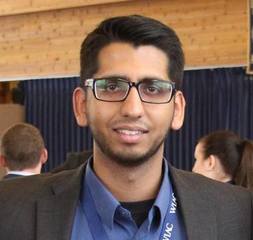“This program taught me critical analysis skills. And being able to go through readings, being able to derive understandings and apply them in our work is something that I’m glad that I picked up.”
H.H. – Summer Student Program (SSP), 2019
“This program taught me critical analysis skills. And being able to go through readings, being able to derive understandings and apply them in our work is something that I’m glad that I picked up.”
H.H. – Summer Student Program (SSP), 2019

“The IIIT Summer Certificate Program was a transformational experience that impacted how I perceive the world. It changed me inside and out. I am studying to be a medical doctor and have a very focused background in biology. I thought science was everything, but after attending the IIIT program I felt that I was missing a huge part of academics. My eyes were opened to the need to learn about economics, poverty and mental health affecting women. IIIT impressed on me how multidisciplinary subjects are going to help me to be a better doctor who is doing more than just treating patients – I now want to better understand them, and have gotten involved with social services organizations to learn about other distresses people experience, including financial, emotional and educational.”
– K. Naz, 2018 TFI student.
“I’m pursuing a Ph.D. program in communications studies, and my university doesn’t offer any courses in Islam. My participation in the TFI Summer Program gave me a very intensive view of Islamic studies and a way that I could situate my field and Islam. The residential part of the program gave me exposure to 20 other students and I could see how they were working to bridge the gap between Islam and their work in anthropology, political science and other topics. I really liked how the faculty were willing to accommodate diverse views and different opinions and show flexibility in the study of Islam.”
– S. Musleh, 2018 TFI student.
“I started working on my IIIT Certificate in Islamic Thought as a college journalism student. I have tried to mold that learning into my job as a journalist because as a Muslim, I need a foundation to better represent the community. I use that training every day when I am writing stories and reporting. For example, with the recent mosque shootings in New Zealand, if I didn’t have the IIIT training, I would have focused my reporting on the shooter, as the rest of the media did. IIIT helped me not to focus on the attacker, but the victims. I still find it amazing that one can study part-time while having a full-time job, and access a myriad of scholars on a global scale and engage directly with professors. IIIT truly stands out from other programs.”
– U. Farooq, 2018 TFI student.
“I’m doing research on religious studies in the global context, more specifically on the Arab Spring in the Middle East and how those ideas were formulated. Attending and participating in the IIIT Summer Program was an important moment in my academic journey. It helps me understand the theoretical framework that I had been struggling with and introduced me to references in Islamic studies that I had never heard before. I now have wide connections of colleagues and professors who formed a group that still has discussions. I know and admire them and try to stay in touch, and they introduce me to other connections – it’s like a chain and a community to support me, not only with my Ph.D., but in building my career beyond that.”
– M. R. Muzakkir, 2018 TFI student.
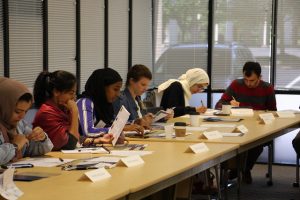
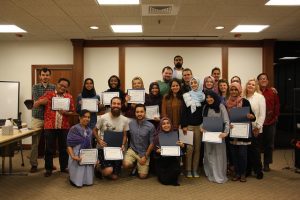
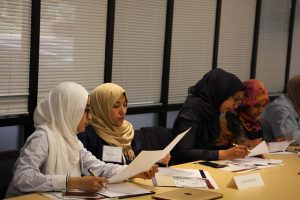
All the courses at SSP were amazing. Nevertheless, I would like to highlight one of them: the Maqasid Al-Shari’ah course. It is very relevant for me because as a political scientist, we are more familiar with the question of ‘why’ rather than ‘how’. The maqasid approach creates a space for us, ‘the students of context’ to be more involved in the broader discussion of our textual traditions. But at the same time, this methodology also provides a challenge. The challenge is in how to balance our consequentialist considerations with our principles in formulating policies. For me, Maqasid Al-Shari’ah is an invitation for embarking upon further knowledge integration.
The benefits of SSP continue after the conclusion of the program. As one of the SSP 2016 student fellows, I was supported by IIIT to participate in various academic (MESA, AAR) and non-academic events (ISNA, IMSA). This opportunity helps me to expand my social network far beyond my small academic circles. As a result, I feel more motivated to be involved in the Muslim societies.
-Thoughts from our Summer Student Program ’16 Class Speaker
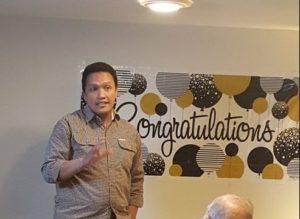
Once the program had started, I found myself enjoying the courses. All staff and professors are so welcoming that I began to feel IIIT and TFI were like my own “home.” The quality of the program is extremely high. The program offers courses taught by prestigious scholars from various universities, including George Mason and Georgetown Universities. One of my favorite courses was “Academic Study of Religion: The Case of Islamic Studies in Western Academia” taught by Dr. Abdulaziz Sachedina. Throughout the readings and discussions, I learned how insufficient efforts to know about Islam were paid under the influence of Eurocentrism. Even today, there is a strong tendency to generate simplified and distorted images of Islam, labeling entire Muslim communities and all Muslims as evil terrorists. What strikes me the most in the class was my professor’s comment on the situation. In the class, the professor stated, “Muslims should not distance from ISIS by saying that ISIS is not Islam. We have obligations why ISIS emerged and how we can confront with them.” In Dr. Ovamir Anjum’s class, he showed us how extremists interpret Quran and how they use their distorted interpretations for justification of excessive violence. Actually, I found these courses quite helpful not only for students gaining expertise in Islamic Studies but also those who study international relations, foreign policies, national security, and much more.
Through this program, I met many great people and made so many friends with diverse backgrounds.
– Shino Yokotsuka, Graduate Research Intern at the Center for Islam and Religious Freedom and Event Management Intern at the Fairfax Institute
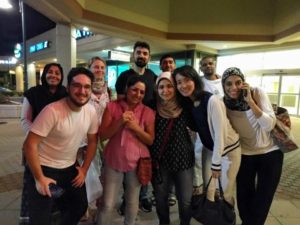
The Winter Student Program introduced me not only to important ideas in Islamic Scholarship, but also an amazing group of students from all over the country. In and outside of the classroom it was humbling and warming to be surrounded by my peers at IIIT. We were able eat and go out in Fairfax and DC together as we got to know each other during the program. I was inspired by their knowledge, past experiences, and genuine kindness. Building these bonds and relationships also contributed to a great classroom experience and atmosphere. Our teachers and advisors were equally generous, understanding, and brilliant. They were able to make our short, rigorous schedule memorable and engaging.
I recommend this program to any and all students who are curious and eager to learn more about Islamic studies. I promise the Fairfax Institute and IIIT will leave you with treasured memories, teachers, and friends.
-Asha Athman, Senior at George Mason University studying Global Affairs and Arabic
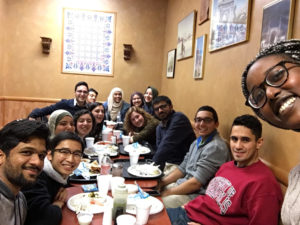
With the program only being a week long we were immersed into the topics such as Qur’anic Worldview, The Sunnah, Maqasid, Islam in America, etc. very fast. I felt that with the topics being so diverse I really got a well-rounded and full circle understanding of Islam that complemented my previous knowledge. These classes were not only engaging due to the content but also because of the elite professors we were so privileged to learn from. These professors came from all different backgrounds and specialties that provided a unique collection of ideas that were truly enlightening.
Not only did I gain knowledge I am extremely grateful for from this program but I made incredible, life-long friendships. The group of my peers that I learned alongside was so intelligent coming from many prestigious universities across the United States. The conversations in class were engaging and interactive and it was humbling to be among such bright individuals. Since we only had a week to spend together we made sure to be very inclusive with everyone and we became very close very fast. I can honestly say we all still keep in contact almost a year later and whenever we are in the same geographical location we make an effort to meet up.
Not only were the friendships I gained from this experience rewarding, but the relationship with the IIIT faculty we all gained were so fulfilling. This is truly an astonishing group of individuals who are so inviting and eager to share Islam and its teachings. IIIT is an institute not only active in the Muslim community but one that makes an effort to integrate itself with the community of Northern Virginia and for that matter the United States altogether. I would recommend the IIIT Winter or Summer Student Program to anyone who even has the slightest interest in it. It was a remarkable experience with so many gratifying moments that I will remember for my entire life.
– Katherine Kiskin, Ohio State University, WSP Class of 2016
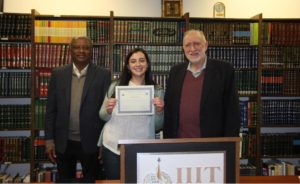
The IIIT Summer Students’ Program (SSP) was an unforgettable experience for me. This month-long intensive program introduced me to a myriad of topics in Islamic Studies, including Contemporary Islamic Thought, Islamic Jurisprudence, Muslim History and Civilization, Qur’an and Sunnah. I was privileged to learn from a cadre of distinguished academics in the field, in addition to interacting with students from a range of disciplinary orientations, including religious studies, history and the social sciences.
Perhaps the most beneficial aspect of the IIIT SSP was the safe space that it provided for me to explore the theoretical and topical issues that captivated my attention. I have always been interested in the intersection of religion, race and identity, particularly as it relates to Black Muslim communities in the Americas. For my SSP research paper, I looked at Black Muslims’ transition from proto-Islamic movements such as the Nation of Islam to ‘orthodox’ Sunni Islam, with a view to investigating whether Blackamerican Islam, as embedded in the Sunni tradition, provides an adequate discursive space for Black self-authentication. I was fortunate to be selected for a IIIT Research Fellowship at the end of the program to further develop my research.
My participation in IIIT SSP definitely encouraged me to continue exploring questions surrounding religion, race and identity. I will commence my PhD in Anthropology at Princeton University, where I intend to pursue research in this area. I would recommend this program to anyone eager to study Islam and Muslim communities through a multidisciplinary lens in a stimulating academic environment.
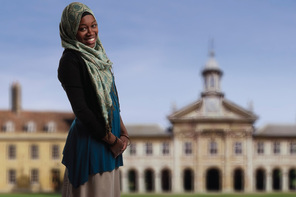
I was a student in the Summer Student Program of 2013. The program complimented the BA degree in Public Policy with minors in African Studies, Jewish Studies, and Islamic Studies which I had received a few weeks before from the University of Delaware. Coursework in Islamic Jurisprudence and Contemporary Islamic Thought allowed me to explore perspectives of Islam that I had yet to explore within my own university. Coursework concerning Islamic global affairs and in Islamic political movements deepened my passion for the intersection of politics and religion. I was able to take what I learned in the classroom and then explore it through the alternative lens of gender within my final proposal. I was very privileged to have a community of scholars who allowed me to do so and who supported my interests.
With the advice of IIIT scholars and with financial help from IIIT, I was then able to move to Amman and pursue Modern Standard Arabic for three terms at Qasid Arabic Institute. After living in Amman for a year, I then moved to London to pursue an MA degree in Middle Eastern Studies where I continued to pursue the intersections of politics, religion, and gender. I do not think I would have moved to Amman or applied for a degree at SOAS after if not for the initial encouragement and support of IIIT.
I aspire to pursue a PhD in the coming years so I can continue to pursue the intersections of religion, gender, and politics either in the United Kingdom or in the United States. I continue to maintain contact with both my peers in IIIT and the scholars who assisted me at IIIT.

Last summer, I had the privilege to participate in the International Institute of Islamic Thought (IIIT) Summer Student Program (SSP). Although I was nervous as the youngest student in my cohort, IIIT’s ethos of intellectualism quickly eased my anxiety by cultivating a collaborative learning environment where stimulating classroom lectures led to passionate discourse among students. Thus, I am forever indebted my colleagues and the renowned scholars who facilitated our deeper inquiry into the depths of the Islamic tradition, different epistemological and methodological approaches for its study, and its role in grappling with contemporary challenges. I echo my colleague Jibreel Delgado in saying that the scholarly networks and friendships we developed that summer will continue to enhance our personal and professional growth for years to come.
In his previous post, Jibreel aptly summarized the plethora of academic and civic engagement opportunities during the program. As an aspiring young scholar, I also benefited tremendously from the Summer Institute for Scholars where I learned to emulate quality scholarship and intellectual exchange. While the diversity in backgrounds led to fascinating debates, the participants’ mutual respect and sincerity struck the hearts of all in attendance. Thus, I felt a profound sense of spiritual and intellectual synergy as we sat together after the evening prayer to reflect on both programs at the commencement dinner hosted graciously by Dr. Jamal Barzinji. As a Muslim student, while my undergraduate training taught me valuable critical thinking skills and fostered an itch to ask difficult questions, it was refreshing to connect those academic pursuits with my own spiritual development.
At the end of the program, I was honored to have been selected as one of four recipients of the IIIT Student Research Fellowship award. The fellowship enabled me to further develop my research on the relationship between religion and state policy in post-revolutionary Iran by examining its regulated system of donor compensation. With the mentorship of our summer faculty and other IIIT scholars, I was able to present this project at my alma mater, Wake Forest University, and the international Social Policy in the Middle East and North Africa conference hosted by the United Kingdom’s University of Bath. The venue was the historic Bath Royal Literary and Scientific Institute and participants included ministers, non-profit leaders, policy makers and academics from across the MENA region. At the conference, I was surprised by the interest in my analysis of religion which demonstrates the critical need for such scholarship to inform government policies. Hence, I plan to return to the D.C. area as a federal analyst for Deloitte Consulting where I hope to enhance my academic study with practical experience in the realm of public policy.
In collaboration with my fellow award recipient, Courtney Dorroll, I also published in the American Journal of Islamic Social Sciences (AJISS) on this past year’s IIIT panels at the annual Islamic Society of North America (ISNA) convention in Detroit. Our collaborative efforts then culminated in my visit to Wofford College in Spartanburg, South Carolina. During this visit, we facilitated discussions regarding Muslim life on southern college campuses with three sections of Courtney’s World Religions course and a group of students studying Interfaith Engagement. Then, with the support of Wofford’s Office of the Chaplain and Muslim Students Association, I had the privilege to lead Wofford’s first public Muslim Friday Prayer and contribute on a panel titled Muslim in the American South: Engaging Religious Difference in Post-9/11 America. Ultimately, IIIT’s SSP paved the way for these achievements and I am excited for the future of this promising program.
